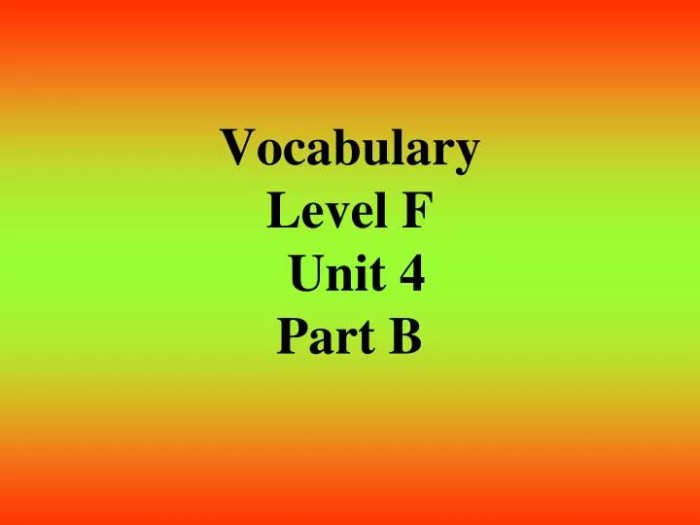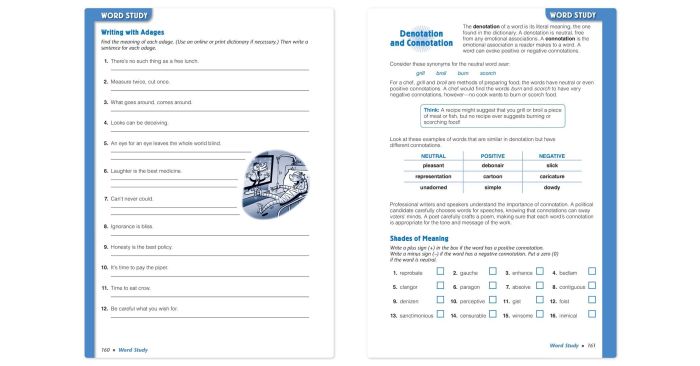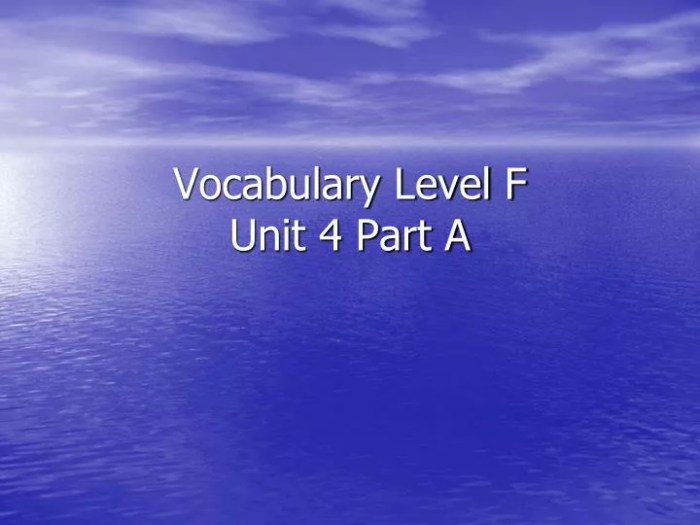Embark on an exciting adventure with Vocabulary Level F Unit 1, where words ignite your imagination and empower your communication skills. Join us as we explore the vast vocabulary landscape, unlocking the secrets of effective vocabulary acquisition and assessment. Dive into engaging activities that foster vocabulary growth and witness the transformative power of integrating vocabulary across content areas.
Prepare to elevate your linguistic prowess and embark on a journey that will expand your vocabulary horizons like never before.
Vocabulary Level F Unit 1

Vocabulary Level F Unit 1 introduces students to a range of new words that are essential for understanding and communicating in everyday situations. These words are commonly used in both spoken and written English and are fundamental for building a strong foundation in the language.
Here is a list of key vocabulary words and their definitions:
- Across:from one side to the other
- Against:in opposition to
- Around:in or to all directions from a center
- At:in, on, or near a place or thing
- Away:at a distance
These words can be used in a variety of contexts. For example:
- The cat ran across the street.
- I am against smoking.
- The children played around the house.
- I will meet you at the library.
- Please go away.
By understanding and using these key vocabulary words, students can improve their communication skills and expand their vocabulary.
Methods for Vocabulary Acquisition: Vocabulary Level F Unit 1
Enhancing your vocabulary is a crucial aspect of language proficiency. Effective methods for acquiring new words can help you expand your expressive abilities and enhance your comprehension. This section delves into practical strategies for vocabulary acquisition, including the use of context clues and techniques for memorizing and retaining new words.
Using Context Clues
Context clues are hints within a text that can help you infer the meaning of unfamiliar words. They can appear in various forms, such as synonyms, antonyms, definitions, examples, or comparisons. By carefully examining the surrounding context, you can often deduce the meaning of a new word without resorting to a dictionary.
- Synonyms:Words that have similar meanings can provide clues about the meaning of an unfamiliar word. For example, if you encounter the word “pulchritudinous” and the sentence mentions “beauty” or “attractiveness,” you can infer that “pulchritudinous” means “beautiful” or “attractive.”
- Antonyms:Words that have opposite meanings can also help you determine the meaning of a new word. For example, if you read the sentence “The weather was inclement,” and you know that “inclement” means “not good,” you can conclude that the weather was bad.
- Definitions:Sometimes, the meaning of a word is explicitly stated within the text. For example, if you encounter the word “ephemeral” and the sentence says “Ephemeral means lasting for a very short time,” you have a clear definition of the word.
- Examples:Examples can provide concrete illustrations of how a word is used. For example, if you read “The child’s laughter was mellifluous,” and you understand that “laughter” refers to the sound of laughing, you can infer that “mellifluous” means “sweet-sounding.”
- Comparisons:Comparisons can also offer clues about the meaning of a new word. For example, if you encounter the sentence “The pain was as sharp as a knife,” you can deduce that “sharp” means “causing a lot of pain.”
Memorizing and Retaining New Words
Once you have inferred the meaning of a new word, it is essential to take steps to memorize and retain it. Here are some effective techniques:
- Spaced Repetition:This involves reviewing new words at increasing intervals. For example, you might review a new word once on the day you learn it, then again after a week, then again after a month. This helps to strengthen your memory for the word.
- Active Recall:This involves trying to recall a word from memory without looking at it. You can do this by covering up the word and trying to say it out loud or write it down. Active recall is more effective than simply rereading the word.
- Use It or Lose It:The best way to retain new words is to use them in your own speech and writing. Try to incorporate new words into your conversations, emails, and other forms of communication.
Assessment of Vocabulary

Assessing vocabulary comprehension is crucial for monitoring students’ progress and tailoring instruction accordingly.
Methods for Assessing Vocabulary Comprehension
- Formal Tests:Standardized tests like the Vocabulary Assessment and Placement Exam (VAP) provide a comprehensive evaluation of vocabulary skills.
- Informal Assessments:These include observations, quizzes, and discussions that teachers can use during regular instruction to gauge students’ understanding of new words.
- Self-Assessments:Students can reflect on their own vocabulary knowledge and identify areas where they need improvement.
Vocabulary Assessment Table
| Assessment Method | Description ||—|—|| Cloze Test | Students fill in missing words in a text. || Sentence Completion | Students complete sentences with appropriate vocabulary words. || Multiple Choice | Students choose the correct meaning of a word from a list of options.
|| Definition Matching | Students match vocabulary words with their definitions. || Synonym/Antonym Identification | Students identify synonyms or antonyms of given words. |
Using Assessment Results to Guide Instruction
Assessment results provide valuable information for teachers to:
- Identify students’ strengths and weaknesses in vocabulary.
- Adjust instruction to meet individual student needs.
- Provide targeted support for students struggling with vocabulary acquisition.
- Monitor students’ progress over time.
Vocabulary Activities

Engaging vocabulary activities can foster vocabulary growth by making learning enjoyable and interactive.
Interactive Games
-
-*Word Charades
Students act out words or phrases while others guess.
-*Pictionary
Students draw words or phrases on a whiteboard while others guess.
-*Scrabble or Bananagrams
Students use letter tiles to create words, encouraging vocabulary exploration and strategic thinking.
Collaborative Activities
-
-*Word Walls
Create a classroom display of vocabulary words and definitions, allowing students to refer to them throughout lessons.
-*Vocabulary Journals
Students keep a notebook where they write down new words, definitions, and sentences using those words.
-*Word Roots and Affixes
Vocabulary level f unit 1 might be challenging, but it’s important for understanding the nuances of the language. Fortunately, there are resources like William W. Bill Haury Jr. who provide insights into the complexities of vocabulary. These resources can help you master vocabulary level f unit 1 and improve your overall language proficiency.
Introduce students to word roots and affixes to help them decode and understand unfamiliar words.
Technology-Based Activities
-
-*Online Games
Utilize websites and apps that offer interactive vocabulary games, such as crosswords, puzzles, and quizzes.
-*Digital Word Walls
Create online word walls using tools like Padlet or Google Jamboard, allowing students to access vocabulary from anywhere.
-*Virtual Vocabulary Flashcards
Use digital flashcards on platforms like Quizlet or Anki to practice vocabulary in a convenient and engaging way.
Real-World Applications
-
-*Vocabulary Scavenger Hunt
Hide vocabulary words around the classroom or school and have students search for them.
-*Vocabulary in Context
Provide students with texts or articles that contain the target vocabulary, encouraging them to use the words in meaningful contexts.
-*Vocabulary Field Trips
Take students on field trips to places where they can encounter and use the target vocabulary in real-life situations.
These activities foster vocabulary growth by providing students with multiple opportunities to interact with and apply new words, making learning fun and memorable.
Integration with Other Content Areas

Integrating vocabulary across content areas is crucial for students’ overall language development and academic success. By connecting vocabulary to different subjects, students can expand their understanding of the words and concepts they encounter in each discipline. This integration fosters a deeper comprehension of subject matter and promotes critical thinking skills.
Connecting Vocabulary to Other Subjects, Vocabulary level f unit 1
In mathematics, for example, students can learn vocabulary related to measurement, geometry, and data analysis. By incorporating these words into math lessons, students can not only understand the concepts but also develop a strong foundation for mathematical reasoning.In science, students encounter vocabulary related to the natural world, such as ecosystems, cells, and the periodic table.
By connecting these words to science concepts, students can deepen their understanding of scientific phenomena and develop a richer vocabulary for describing the world around them.
Enhancing Overall Learning
Integrating vocabulary across content areas enhances overall learning by:
-
-*Promoting Vocabulary Retention
By encountering words in multiple contexts, students are more likely to remember and understand their meanings.
-*Expanding Vocabulary Depth
Integration exposes students to a wider range of words, allowing them to develop a deeper understanding of the nuances and shades of meaning.
-*Developing Critical Thinking Skills
Connecting vocabulary to different subjects encourages students to make connections between concepts and develop critical thinking skills.
FAQ Guide
What is the significance of vocabulary in language learning?
Vocabulary forms the building blocks of language, enabling us to express our thoughts, ideas, and emotions effectively. It is the foundation upon which we construct meaningful sentences and engage in purposeful communication.
How can I improve my vocabulary retention?
Effective vocabulary retention involves active engagement with new words. Practice using them in different contexts, create flashcards for spaced repetition, and immerse yourself in reading and listening materials that expose you to a wide range of vocabulary.
What are some effective vocabulary assessment techniques?
Vocabulary assessment can be conducted through various methods, including multiple-choice quizzes, fill-in-the-blank exercises, and oral presentations. These assessments help gauge your understanding of word meanings, usage, and context.